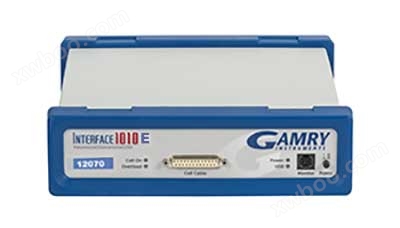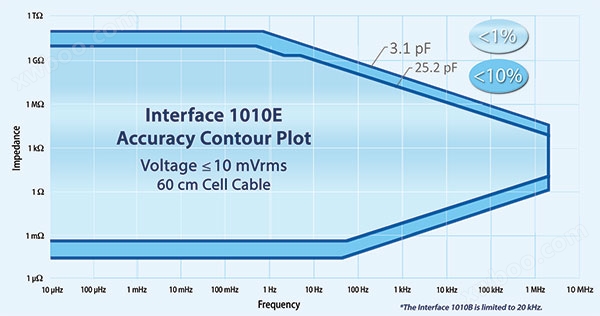
Interface 1010E
Interface 1010E is a universal electrochemical workstation that can perform various electrochemical measurements, including electrochemical impedance technology.
System features:
Interface 1010E
Interface 1010E can perform various electrochemical measurements, including electrochemical impedance technology. For example, applications such as physical electrochemistry, electrochemical corrosion, battery testing, fuel cell testing, solar cell testing, and sensor development.
Electrochemical impedance spectroscopy

flexible configuration
Interface 1010E can be used for single channel, dual channel, or multi-channel combinations. GAMRY provides flexible configuration.
More details
Below are more performance features of Interface 1010E. Each bullet point represents a performance.
- Physical electrochemistry-Cyclic voltammetry, linear sweep voltammetry, chronoamperometry, chronopotentiometry, chronocoulometry, multi-step chronoamperometry, and multi-step chronopotentiometry techniques.
- Pulsed voltammetryDifferential pulse voltammetry, conventional pulse voltammetry, reverse pulse voltammetry, Osteryoung square wave voltammetry and related techniques such as anodic stripping voltammetry.
- DC corrosion-Conduct standard DC corrosion tests, such as polarization resistance, potential, cyclic polarization, and galvanic corrosion
- Electrochemical energy devices-Test individual cells and stacks of batteries, capacitors, and fuel cells. Typical testing techniques include charging, discharging, cyclic charging and discharging, constant potential, constant current, self discharge, leakage rate, and read potential.
- Electrochemical signal analyzer-Software for collecting and analyzing electrochemical noise signals related to time. Continuous monitoring of voltage and current at rates ranging from 0.1 Hz to 1 kHz. Fully functional analysis tools, such as statistical analysis, trend analysis, impedance spectroscopy, and histogram analysis.
- Electrochemical frequency modulation-A non-destructive method for measuring corrosion rate. Through this technology, the corrosion rate is directly measured without the Tafel constant. In addition, this technology can determine the Tafel constant and provide parameters related to pitting corrosion.
- critical pitting temperature-Control Gamry constant potential, TDC4 temperature controller, and related accessories to automatically measure the critical pitting temperature of materials.
- electrochemical noise-Electrochemical noise testing is a more common technique. It is a software package compatible with ECM8 multiplexer for electrochemical noise measurement.
- Electrochemical impedance-In addition to single frequency Mott Schottky measurements, it also includes constant potential, constant current, and mixed impedance measurements. This includes unique multi wave weighting techniques to improve signal-to-noise ratio. In terms of analysis, equivalent circuit diagrams are used to fit the data, Kramers Kronig conversion evaluation data and graphic editor, etc. The software includes an impedance simulation section.
- eChemACTool kit - software tool kit for fully controlling the constant potential meter for impedance (EIS) measurement and EFM experiments.
Other details
- Measurement of electrodes 2, 3, and 4
- Electrical isolation
- Floating ground: used for high-pressure vessels, mechanical stress equipment, or pipelines.
- portable
- The size of a chemistry textbook weighs only 3 kilograms. Connect USB 2.0 to a Windows computer.
-
Built in EIS
- Advanced DDS is used for EIS measurement from 10 μ Hz to 2 MHz.
- DSP (Digital Signal Processing) mode
- Oversampling mode improves signal-to-noise ratio and precise capacitance measurement.
- Oversampling mode improves signal-to-noise ratio and precise capacitance measurement.
- Gamry potentiostat and its control software adopt linear regression method to accurately measure and achieve IR compensation.
- Auxiliary I/O
-
Through I/O design, control third-party devices: achieve external signal input, analog voltage output, analog current output, auxiliary A/D input, and digital I/O connectors.
-
- Value retention period
-
2-year manufacturer warranty service.
system
Potentiostat correct galvanostat correct Zero resistance current meter correct Floating design (insulated from the ground) correct electrode connection 2, 3 or 4 electrodes Maximum current ±1 A Current range 9 (10 nµA-1A) Current range (including internal gain) 11 Minimum current resolution 3.3 fA Maximum applied potential ±12 V rise time <1 μs Minimum time base 10 μs Noise and Ripple (Typical) <20 μVrms weight 2.4 kilograms 2.4 kilograms 24 (W) x 6 (H) x 27 (D) 27 centimeters control amplifier
cell voltage ±20 V (@ 1A) Output Current >±1 A speed setting 5 Gain bandwidth (typical) 980, 260, 40, 4, 0.4 kHz EIS measurement
Frequency range 10 μHz - 2 MHz Impedance accurate diagram Refer to the impedance precise diagram Apply voltage amplitude 2.33 V maximum
17.8 μV minimumPotentiometer
Input impedance >1012Ω Input Current <20 pA bandwidth >10 MHz CMRR >80 dB (10 kHz)
>60 dB (1 MHz)potential
Apply precision ± 1 mV ± 0.2% setting range Apply resolution 200 μV, 50 μV, 12.5 μV/bit measurement accuracy ± 1 mV ± 0.3% reading range measurement resolution 1 μV, 10 μV, 100 μV, 400 μV/bit Apply current
Apply precision ± 5 pA ± 0.3% range Apply resolution 0.0033% measuring current
measurement accuracy ± 5 pA ± 0.3% application/measurement resolution measurement resolution 0.0033% Apply/measure resolution >10 MHz (1A - 100 μA)
>1.5 MHz (10 μA)
>0.15 MHz (1 μA)
-

